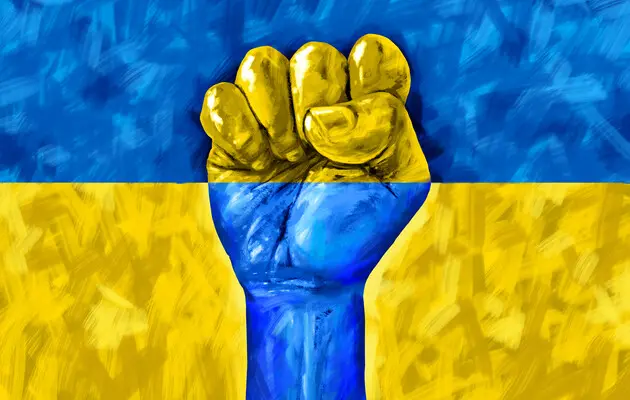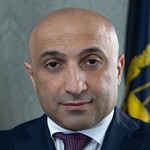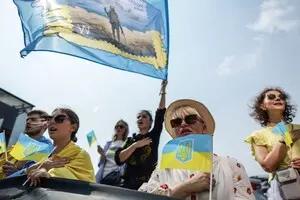Transitional justice: a dialogue about the future
The Peace Summit recently ended in Switzerland. Each and every person who wanted to expressed their opinion has given their assessment of this event.At the same time, in my opinion, the Summit once again shed light on a very important problem - we must now carefully prepare for the "post-war" period . Even the active phase of the war should not take away from us the ability to construct the future. Because it is difficult to talk about peace if we are not ready for it. And our actions today will largely determine what kind of peace it will be.
There are many approaches and tools in the world for rebuilding life after a period of armed conflict. And quite often, it is important to start building its architecture not after the end of the war or the overthrow of an undemocratic regime, but to work with the demands of society, prepare institutions and the population for future difficulties. So that "peace" does not become a new shock. In general, this policy was called " transitional justice ". In theory, transitional justice is a legal concept, but it is not necessary to delve into complex legal terms to understand it. In practice, it is about the rules and features of a society's exit from an armed conflict or the transition from an undemocratic to a democratic regime. Very often, unfortunately, these periods are no less complex and controversial, and are accompanied by political, social, economic crises, a demand for justice, the need to rebuild not only buildings, but also institutions, and, of course, it is about the understanding and awareness of experience war and the reconstruction of consciousness. No matter how difficult it is for us, we should already be preparing for this stage.
Both while working in the prosecutor's office and being mobilized to the Armed Forces, I never stopped studying the experience of transitional justice and came to certain conclusions. First of all, there are no ready-made "recipes" on how to get out of a conflict easily and with the least losses. That is why we cannot simply take a manual or use the experience of another country. In general, Germany is considered to be the most successful example of transitional justice, a country that was itself an aggressor and was actually "helped" to implement transitional justice. So for us, this example is interesting, but not entirely relevant. On the other hand, we don't have to copy the experience of another state completely, but we can use successful cases and elements.Ultimately, it is important to understand that transitional justice is more about social dialogue and, as a result, a certain social agreement on the key points of state development.
What are the main "pillars" of transitional justice? As a rule, they are distinguished by four (of course, this list can be supplemented, but these are fundamental) - reparations for victims of armed conflict, prosecution for international crimes, the right to the truth, and, ultimately, reforming the system, which should be a factor preventing conflict in the future. That is, it is about the fact that the resident of Kherson, who was kept in the torture chamber, should know that his testimony against his tormentors is not in vain and will not disappear, but will become part of the accusations; a resident of Dnipro, whose apartment was hit by a rocket, must understand where to go to receive compensation; and residents of the de-occupied territories should understand that they will not be condemned for trying to survive the occupation.
In fact, we have faced the challenges of transitional justice since the beginning of independence, when we faced the difficult task of building democratic institutions. Therefore, we have already tried to implement certain elements of transitional justice: both in the 1990s, and after the revolutions of 2004 and 2013-2014, and after the beginning of Russian aggression. For example, such attempts include an attempt to carry out a lustration, the establishment of the Institute of National Memory, the development of the so-called "war department" in the Prosecutor General's Office, which coordinates the investigation of international crimes, and the institutionalization of anti-corruption bodies. Unfortunately, it was a chaotic process. That is why we need comprehensive approaches now and in the future. Real changes instead of imitation. So let's pay attention to the key positions on each of the points that require public dialogue to eventually become our vectors.
Reparation
The interests of victims should be at the center of any justice system. This is the cornerstone of effective and human-centered implementation methods. And reparations are one of the necessary steps to restore victims' rights. Of course, it is not only about finances, but also about a certain moral satisfaction, as well as the restoration of violated rights. Already now we have to understand how we will restore criminal justice, how documents will be verified, what to do with property rights that came into force during the occupation. There are hundreds of such questions.
As for the compensation mechanism as an important element of the general architecture of justice restoration, it is important to understand the scale - currently in Ukraine we have hundreds of thousands of victims who have lost their homes, property and, worst of all, their relatives. They are entitled to compensation. We have already launched the work of the International Register of Damages and Compensations for Victims of Russian Aggression. So far, the launch is focused on the residential property damage or destruction category. This is the first element of the international compensation mechanism, which will also consist of a compensation commission and a compensation fund. And this is important. However, there are already worrying moments. First of all, the registry does not take into account damage done before a full-scale invasion, that is, until February 24, 2022. And this means that not all victims have equal access to justice, which is fundamentally wrong. Working in the prosecutor's office before the full-scale invasion, I constantly encountered victims of aggression. Therefore, I understand how painful such decisions are for them. Here, in my opinion, the state should take responsibility and create an adequate compensation mechanism that will equally compensate the damage to all victims. In addition, it is important to understand that compensation for damage, on the one hand, is the duty of the state to its citizens, and on the other hand, it is related to the topic of reparations, which sooner or later must be paid by the aggressor state, and the confiscation of assets. And here I would emphasize that there should be a unified approach to these issues, which are solved primarily in the legal and not the political field. So we will be able to ensure the objectivity of the process. Moreover, it is also about the appeal of Ukraine to investors.
Prosecution for international crimes
A lot has already been said about this. However, we still do not have an understanding of what an effective justice mechanism should be for the consequences of Russian aggression. I researched this issue a lot and came to the conclusion that the most realistic and effective at this stage seems to be the strengthening of specialization. This can be the development of temporary specialized institutions in Ukraine, which would be engaged in the investigation and prosecution of those guilty of international crimes, or the strengthening of specialization in already existing institutions. At the national level, it is primarily about the most massive war crimes. The specialization should cover the law enforcement agency, the prosecutor's office and the court. As it is, for example, in our anti-corruption bodies. Of course, there is also the International Criminal Court, which deals with the highest Russian military and political leadership. And the development of the national architecture of justice in no way contradicts its activities. But the scale of the crimes committed in Ukraine is such that hoping for the punishment of absolutely all war criminals, unfortunately, seems idealistic. However, we must do everything in our power to restore the rights of most of the victims.
In addition, people who are under occupation (some of them for decades) should receive clear answers from the state of Ukraine, what is expected of them, whether or not they will be punished according to our legislation. It is obvious that many citizens from the occupied territories are afraid of the issue of persecution and responsibility for various forms of cooperation with the occupation authorities. And the introduction of the provision on "collaborative activity" into the Criminal Code in 2022 did not provide the necessary answers. Moreover, it actually criminalized any interaction with the aggressor state without taking into account the standards of international humanitarian law, which also does not contribute to building a dialogue. After all, each case must be considered individually, and we cannot put an equal sign between working for the occupation authorities, which calls into question the territorial integrity of Ukraine, and working to ensure the life of the city (for example, doctors, firefighters, etc.). Having repeatedly visited the de-occupied territories, I understand how large-scale this problem is. People who remained in the occupation are afraid. They are afraid that they will be tried as collaborators just for the fact that they were in the occupation. They are afraid that no one will find out who actually supported the occupation authorities, and who survived as best they could. In the de-occupied part of Kharkiv region, I repeatedly heard stories about how the Russian military forced local residents to give them rooms in their homes. And people are afraid because they don't know whether we will perceive them as victims or as criminals. We have to have answers.
And no less urgent is the question that worries me now: will we have the ability to ensure justice? At least with personnel. For example, let's take the prosecutor's office of Crimea. At the time of the occupation, there were 922 people in the prosecutor's office of the Autonomous Republic of Crimea and another 250 in the prosecutor's office of the city of Sevastopol. Currently, the office of the prosecutor's office of the Autonomous Republic of Crimea and the city of Sevastopol consists of only 77 people. That is, if we imagine that in the near future we will de-occupy Crimea, this number will not be enough to rebuild justice on the peninsula. And this, of course, applies not only to the prosecutor's office.
The right to the truth
This is a very complicated and one of the most painful processes. After all, it is about social consciousness and self-identification, liberation from the narratives of Russian propaganda and a sincere desire to know one's own past. But this process is crucial. And this is where the Russian Federation is trying to play, burning Ukrainian books in the occupied territories, destroying or appropriating monuments, and imposing its program in schools.
We have already had quite successful cases of the introduction of memory policy - the development of the chronology of the occupation of Crimea, the establishment of the Ukrainian Institute of National Memory, which partially fulfills these functions. And the very issue of honoring and ensuring the right to the truth can become a means not only of removing the acute emotional reaction due to losses and traumatization of victims and relatives, but also a certain fixation of the validity of the demands of justice and ensuring justice. After all, recording and demonstrating to the victims and their loved ones that their loss is recognized and visible gives a resource of time for immediate justice. Sociological surveys indicate a clear demand for speedy justice, which may often fall short of existing standards. And then measures of memorialization become a means of recognition and stabilization, give the opportunity to both victims and society to wait for national and international mechanisms of reasoned decisions that minimize the risks of impunity. Accordingly, we should consider an unbiased documentary reconstruction of the events, the formation of a national archive, and support for grassroots initiatives aimed at memorialization. After all, it is important to preserve the memory of this war, to disseminate this knowledge and testimony both inside and outside the country as a basis for demanding justice. But there are also many painful questions. For example, what to do with the soldiers' graves of the aggressor country (where our forcibly mobilized citizens may be).
Reformation
This is one of the most extensive topics. After all, it concerns the system as a whole. However, I would like to remind you that we are now talking about a dialog about our future. That is, it is important to have a discourse on the issues of where we are moving and who we want to become after the war. And let me emphasize once again that it is important to discuss this now. After all, a social contract cannot appear out of nowhere. If we want to strengthen democracy, curtailing democracy even in times of war is not the best recipe. If we want to be attractive to investors in the future, we need to prepare the ground in advance. The same applies to the fight against corruption, tax policy, gaining trust in the judiciary, etc.
Ultimately, transitional justice is about the right of people to have answers about life in war and life after peace. In particular, this also applies to our citizens who currently live in the temporarily occupied territories. If we want to return not only territories, but also people, we have to talk to them. In fact, we already had an attempt to respond to these challenges even before the full-scale Russian invasion - at that time I participated in a working group of experts on the reintegration of temporarily occupied territories at the Commission on Legal Reform, where we developed proposals for the president regarding a possible concept of transitional justice for the country. Unfortunately, this concept has not yet been adopted. But it could become the basis for a much-needed discourse about our future and a guideline for building a secure reintegration, if updated to the current conditions.
Read this article in Ukrainian and russian.
Please select it with the mouse and press Ctrl+Enter or Submit a bug













 Login with Google
Login with Google